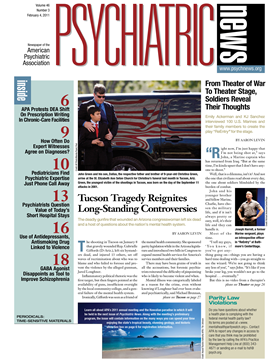The U.S. Supreme Court will decide whether a Vermont state law aimed at limiting third-party access to physicians' prescribing data violates free speech.
The Court agreed last month to hear the case Sorrell v. IMS Health, after the Vermont law—which requires physicians to provide consent before their prescribing data are sold, licensed, or exchanged as a tool for promoting or marketing medications—was struck down by a federal appeals court as unconstitutional last November. The U.S. Court of Appeals for the Second Circuit, in New York City, had ruled that the law was “an improper restriction on commercial free speech” (Psychiatric News, January 7).
Experts had anticipated that the case would move to the Supreme Court because the appeals court's decision conflicted with earlier decisions by the U.S. Court of Appeals for the First Circuit—in November 2008 and August 2010—that upheld similar laws in New Hampshire and Maine limiting use of prescriber information by marketing firms (Psychiatric News, September 3, 2010).
Vermont's “data mining” law limited the sale or use of prescriber information to certain specified activities, including for pharmacy reimbursement, patient care management, and health care research. It was challenged by three companies—IMS Health, Verispan (now SDI), and Source Healthcare Analytics—that compile physician prescribing data and sell the information to pharmaceutical manufacturers.
The law was widely supported by the medical community in Vermont and by most of the state's psychiatrists.
“The bill generated considerable discussion and public dialog when introduced in Vermont,” said APA Treasurer David Fassler, M.D., a Vermont psychiatrist. “It ultimately passed with widespread support, despite the awareness that a legal challenge was likely. I expect the state will mount a vigorous defense of the statute in the Supreme Court.”
The state's lawyers argued that the law restricts conduct—not speech—and that the data miners are buying and selling a commodity, which can be regulated under powers that the U.S. Constitution gives to the states. The three companies, which refer to themselves as “publishers” of health information and not “data miners,” maintained that information on who's prescribing what drugs to whom is speech that is protected by the First Amendment. The appeals court's three-judge panel in November backed this argument.
Jonathan Weker, M.D., the Vermont Psychiatric Association's representative to the Vermont Medical Society, told Psychiatric News after the appeals court decision that many, though not all, Vermont psychiatrists oppose such data collection because of concerns that it could violate their privacy and that of their patients. “As an individual physician, I was astounded to discover that all of the data on my prescribing patterns were being collected and disseminated without my knowledge,” Weker said.
That information includes the name and address of the prescribing physician, the quantity of the medication prescribed, the location in which the prescription was filled, and the patient's age and gender.
Vermont, Maine, and New Hampshire are the only states to enact restrictions on marketers' use of physician prescribing information.

